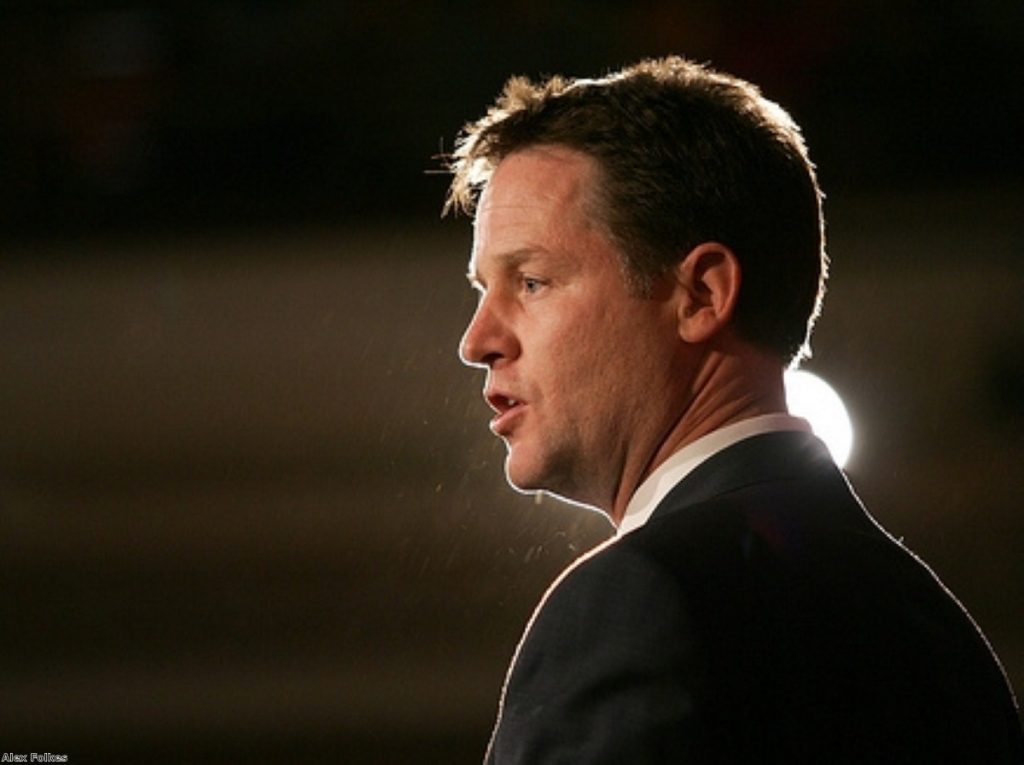Clegg: We’ll tear through the statute book
By Ian Dunt and Alex Stevenson
Nick Clegg has kick-started the campaign to restore Britain’s civil liberties with a promise to “tear through the statute book” to get rid of unnecessary laws.
In a speech delivered this morning the deputy prime minister promised the coalition government will introduce the “biggest shake up of our democracy” since the 1832 Great Reform Act.
“It is outrageous that decent, law-abiding people are regularly treated as if they have something to hide,” Mr Clegg said.


“It has to stop.”
He said the ID card scheme, national identity register and second generation biometric passports would be scrapped.
“We won’t hold your internet and email records when there is just no reason to do so,” Mr Clegg pledged.
“CCTV will be properly regulated, as will the DNA database, with restrictions on the storage of innocent people’s DNA.
“And Britain must not be a country where our children grow up so used to their liberty being infringed that they accept it without question.
“There will be no ContactPoint children’s database. Schools will not take children’s fingerprints without even asking their parent’s consent.”
The Liberal Democrat leader promised to remove limits on the rights to peaceful protest and reform Britain’s libel laws to encourage freedom of speech.
“As we tear through the statute book, we’ll do something no government ever has: we will ask you which laws you think should go,” he added.
“Taking people’s freedom away didn’t make our streets safe. Obsessive lawmaking simply makes criminals out of ordinary people. So, we’ll get rid of the unnecessary laws, and once they’re gone, they won’t come back.
“We will introduce a mechanism to block pointless new criminal offences.”
The speech strongly suggests that the Liberal Democrats intend to make civil liberties a key plank of their activities in government.
With so many Lib Dem members motivated by the issue, Mr Clegg and his colleagues will be keen to secure lasting change as proof that entering into coalition with the Conservatives can still secure his party’s policies.
Mr Clegg said the government would “break up concentrations of power and hand back power to the people”.
His speech was based around three principles: repealing “intrusive and unnecessary laws”, making politics more transparent and redistributing power in line with David Cameron’s ‘big society’ agenda. The Lib Dem leader did not directly refer to the latter.
He said the government will establish a committee to replace the House of Lords with a directly-elected upper chamber whose representatives would be chosen by proportional representation.
Fixed-term parliaments will be introduced in a bid to maintain “stability”. And the proposals of the Wright committee for shaking up the way the Commons works will be implemented.
After addressing “vested interests” in party funding and lobbying groups, which face a mild clampdown, Mr Clegg turned to the issue most dear to Lib Dem hearts: electoral reform.
“No programme to reform our political system is complete without reform of our voting system,” the deputy prime minister said. He confirmed a referendum on introducing the alternative vote system would take place, meaning “MPs will have to secure the support from at least half the people who vote in their constituency”.
With the existing safe seats enjoyed by many MPs, Mr Clegg explained, “millions of people see their votes simply go to waste”.
“Is it any surprise in a system like that we end up with politicians who seem to be out of date with the system they serve? New politics needs fairer votes and this referendum will be our opportunity to make that happen.”
Privacy and civil liberties groups emphatically welcomed the speech but warned that the underlying systemic causes of Britain’s surveillance apparatus had to be addressed as well.
Phil Booth, national coordinator of No2ID, told politics.co.uk: “Thirteen years of assault on our privacy and liberty won’t be undone in 13 days but this list will be a good start.
“It’s a clear political commitment, but places like the Home Office aren’t going to give up without a fight.”
Alex Deane, director of Big Brother Watch, said: “Nick Clegg has spelled out a very welcome series of reforms that we hope will roll-back our overbearing and intrusive government.
“But, while we welcome these changes, the real challenge will be implementing the reforms in the face of strong internal opposition from the civil service.”
The coalition government intends to pass a Great Repeal Act which would tear up some of the legislation passed by the previous Labour government.
Under Tony Blair and Gordon Brown, New Labour became famous for its frenzied lawmaking, with an average of one new criminal offence for every day they were in power.












